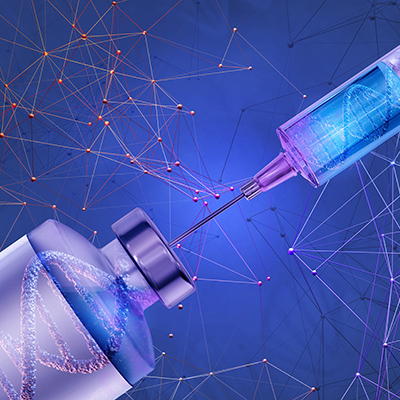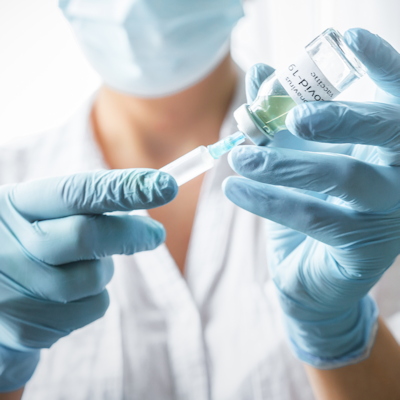 Specialized printer may help vaccines reach more people
Specialized printer may help vaccines reach more people
Researchers have developed a specialized printer to generate vaccine-filled microneedle skin patches that can be stored long-term without refrigeration. Their research, published Monday in Nature Biotechnology, may eventually bring more vaccines to more people. Read More
 Plasmid DNA vaccine protects mice from COVID-19 by triggering T-cell response
Plasmid DNA vaccine protects mice from COVID-19 by triggering T-cell response
A plasmid DNA vaccine designed to trigger a T-cell response has protected most mice from a lethal dose of SARS-CoV-2, delivering preliminary evidence that the candidate may provide broader, more durable responses than existing COVID-19 shots. Read More
 Testing vaccine candidates with lab-grown organoids
Testing vaccine candidates with lab-grown organoids
Researchers have developed a new testing platform that encapsulates B cells -- important immune system components -- into miniature lab-grown organoids. The results, published Wednesday in ACS Central Science, may hasten vaccine screening and significantly reduce the number of experimental animals used in the process, the researchers said. Read More
 Driver of responses to checkpoint inhibitors suggests way to improve cancer therapy
Driver of responses to checkpoint inhibitors suggests way to improve cancer therapy
Expansion of a diverse subset of T-cell clones influences how patients respond to immune checkpoint inhibitors (ICIs), suggesting it may be possible to predict who will benefit from the treatments. Read More
 Implication of nervous system in anaphylaxis opens ways to treat severe allergic reactions
Implication of nervous system in anaphylaxis opens ways to treat severe allergic reactions
Heat-sensing neurons are key contributors to severe allergic shock reactions, according to a study in mice that points to ways to reverse life-threatening symptoms. Read More
 Nasal antibody modulates inflammatory response in COVID-19 patients in small clinical trial
Nasal antibody modulates inflammatory response in COVID-19 patients in small clinical trial
A nasally administered monoclonal antibody modulated inflammatory responses in COVID-19 patients in a small clinical trial. Read More
 Immune homing mechanism enables targeted drug delivery to pediatric brain tumors in mice
Immune homing mechanism enables targeted drug delivery to pediatric brain tumors in mice
Piggybacking on the homing mechanism that the immune system uses to direct white blood cells could enable the targeted delivery of drugs in children with brain tumors, according to research published on Thursday in Nature Materials. Read More
 COVID-19 vaccine development: Public funding yielded private profits
COVID-19 vaccine development: Public funding yielded private profits
Decades before the COVID-19 pandemic, the U.S. government invested at least $337 million into critical research that led to mRNA COVID-19 vaccines. The government also paid $31.6 billion during the pandemic for vaccine research, production, and vaccines for all Americans. Read More
 Adaptive Biotechnologies Q4 revenues rise 46% on NGS test volumes
Adaptive Biotechnologies Q4 revenues rise 46% on NGS test volumes
Adaptive Biotechnologies on Tuesday reported fourth-quarter revenue of $55.2 million, up 46% compared with $37.9 million in Q4 2021. Read More
 Vaccine effectiveness against Omicron variants may change over time
Vaccine effectiveness against Omicron variants may change over time
Researchers from The Chinese University of Hong Kong and the Harvard T.H. Chan School of Public Health in Boston, Massachusetts collaborated on a case-control study and found that two vaccines were generally effective over time against severe outcomes from SARS-CoV-2 Omicron infection. The research, published February 3 in the journal JAMA Network Open, also showed that protection among older individuals was more likely to wane six months after the second dose. Read More
Conferences
Science Briefs
Member Rewards
Earn points for contributing to market research. Redeem your points for merchandise, travel, or even to help your favorite charity.
Research Topics
Interact with an engaged, global community of your peers who come together to discuss their work and opportunities.
Connect
Tweets by @ScienceBoard






